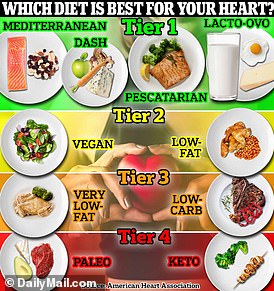Trendy low-carb diets could make you five pounds heavier, according to major new analysis
Diets focused on limiting carbohydrates have been touted for decades as a key to weight loss, but it turns out that not all low-carb diets are slimming–and some can even lead to weight gain.
Harvard researchers studied more than 123,300 people from three different health databases.
The participants ate one of five types of low-carb diets, and their weight loss and body mass index (BMI) were tracked every four years for 20 years.
Researchers found that despite following a general low-carb diet, weight loss was not significant during the study period unless people consumed less animal protein – and some people even gained weight.
People who followed a low-carb diet but continued to eat unhealthy carbohydrates and animal proteins even gained weight during the study.
The average weight gain experienced by people following this unhealthy diet was 2 pounds over a four-year period, although some people saw a weight gain of up to 5 pounds.
Only participants who followed a low-carb diet with lots of plant foods and whole grain carbohydrates, such as oats and whole wheat bread, lost weight – and kept it off.
Harvard researchers analyzed people who followed five different diets with varying intake of plant proteins, meat consumption, fats and carbohydrates. They include: a total low-carb diet (TLCD); an animal-based low-carbohydrate diet (ALCD); a plant-based low-carb diet (VLCD); a healthy low-carb diet (HLCD); and an unhealthy low-carb diet (ULCD)
Study participants who ate what researchers considered a “healthy low-carb diet (HLCD)” consisting of fewer refined carbohydrates – such as those in white rice, soda and white pasta – more plant-based proteins – such as lentils, tofu, peanuts and chickpeas – and healthy fats – such as those found in fish, avocado and eggs – lost the most weight and maintained their weight loss over the study period.
The five diets include: a normal low-carb diet, a low-carb animal-based diet; a plant-based low-carb diet and what they called a 'healthy low-carb diet', with fewer refined carbohydrates, plant-based proteins and low-calorie plant-based fats such as olive oil.
These participants' results were also compared to those who followed an unhealthy low-carb diet, which involved refined carbohydrates, animal protein and unhealthy animal fat.
The databases researchers drew from were the Nurses' Health Study from 1986 to 2010; Nurses' Health Study II from 1991 to 2015; and health professionals Follow-up survey from 1986 to 2018.
The amount of weight people gained or lost after each diet varied based on their BMI measured at the start of the study.
Overall, people who followed the unhealthy low-carb diet saw a weight gain of 0.86 pounds (0.86 pounds) – the biggest gain of the five diets.
People classified as overweight (BMI or 25 to 30) on this diet gained an average of one pound, and those with a BMI of 30 or higher, in the obese range, gained almost two pounds during the study period.
Study participants of all BMIs who followed a general low-carb diet or a vegetarian low-carb diet had no significant weight gain or loss.
The healthy low-carb diet had the biggest impact when it came to long-term weight loss.
People with a healthy BMI lost about 0.5 pounds. Overweight people lost almost 1 pound and obese people lost almost 2 pounds.
As part of the study, researchers also ranked the five diets according to Harvard's Alternative Healthy Eating Index (AHEI). This system assigns ratings to foods and nutrients that are predictive of chronic diseases. The purpose of the index is to rate foods based on their relationship to reducing chronic diseases.
The study found that the “healthier” low-carb diets had better AHEI scores than the others, possibly indicating that the healthier diets may help with chronic health conditions.
These healthier diets consisted of whole grains, non-starchy vegetables, fruits and low consumption of processed meats, sugary drinks and desserts.
Carbohydrates are a type of macronutrient found in many foods and drinks. Most occur naturally in plant foods such as grains, but carbohydrates can also be added by food manufacturers to processed foods in the form of starch or added sugars.
Carbohydrates provide essential nutrients and are one of the main sources of calories that people eat.
There are two types of carbohydrates: simple and complex.
Simple carbohydrates are digested quickly and deliver immediate bursts of energy into the bloodstream. Simple carbohydrates can be natural or added and are found in foods such as sweets, white rice, white pasta and soft drinks.
Added carbohydrates do not keep you full for long because they lack vitamins, minerals and fiber.
However, whole grain or 'complex' carbohydrates contain vitamins, minerals and fiber and take longer to make their way through the digestive system, reducing the temptation to snack.
These can be found in foods such as whole wheat pasta, oats, apples and brown rice.
Carbohydrates play many important roles in the body, including healthy digestion and a source of energy. Too many simple carbohydrates or added sugars can negatively impact blood sugar levels and the pancreas, and can also increase the risk of cardiovascular disease.

